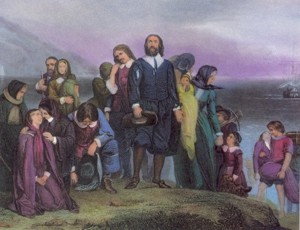| A
movement to reform and "purify" the Church of England by purging away
vestiges of Roman Catholicism. |
 |
|
Engraving
depicting Pilgrims at Plymouth Rock, 1620
|
Puritanism began
during the reign of Elizabeth
I (1558-1603) when some English Protestants objected to Catholic elements
in worship. They also charged that bishops reinforced royal control over
the church; Puritans believed that the church should be independent from
the Crown. They also wanted to end abuses such as plural office holding,
absenteeism, and
low standards for clergy. Puritans wished to "purify" the church by several
means. They gathered like-minded people into independent "congregational"
churches, some declaring separation from the church of England and some
remaining within it. Moderates advocated a polity or church structure
called presbyterianism, as implemented by John
Knox in Scotland. In the 1630s under Archbishop Laud, congregational
churches were repressed. Thousands of Puritans left England, and their
"great migration" contributed to the colonial
settlement of New England. Puritanism's hallmarks were the authority
of Scripture, the conversion experience, and a theology of sin and grace.
Their chief theological mentor was John
Calvin. Puritans believed community life to be defined by covenant,
or solemn agreement. The Christian life was to be a pilgrimage of joyful
discipline; John Bunyan's The Pilgrim's Progress expresses this
ideal.
|